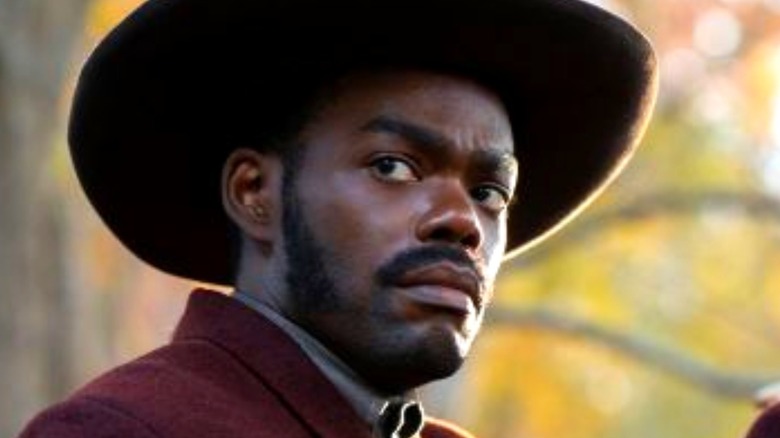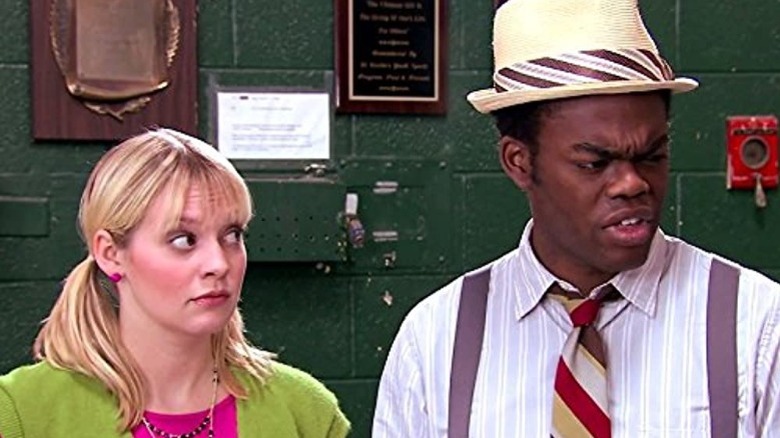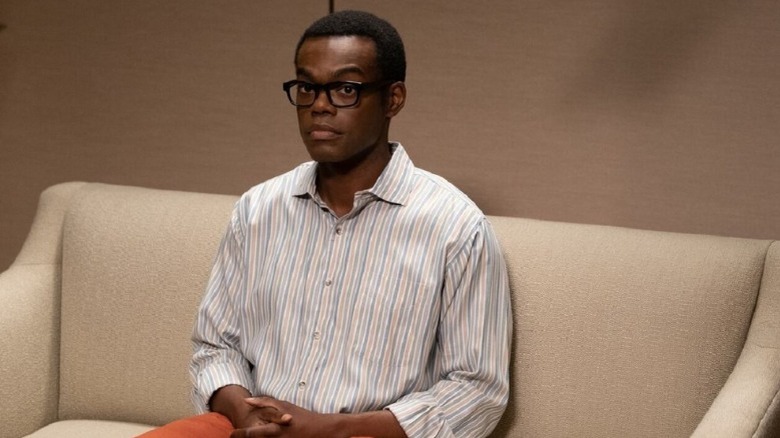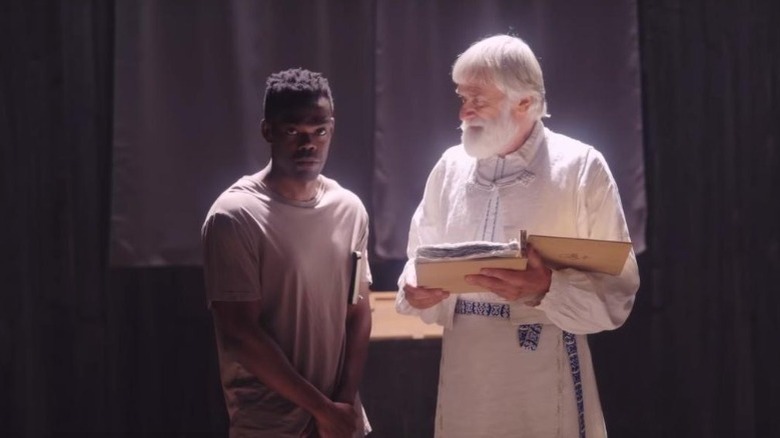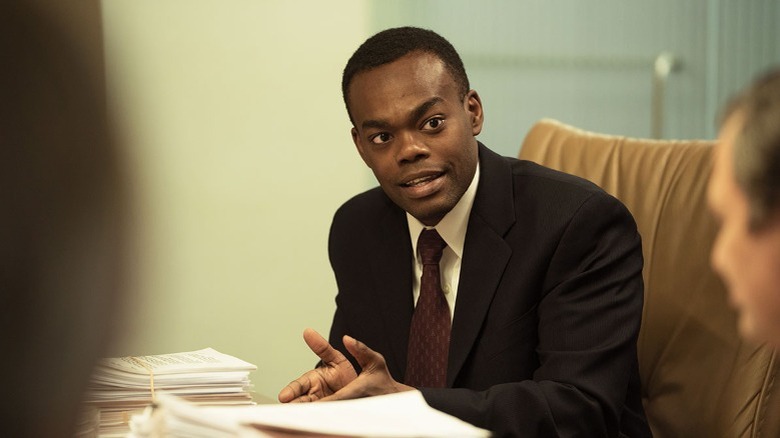Why Royal From The Underground Railroad Looks So Familiar
Co-writing and directing the most critically acclaimed drama of the decade, beating the odds to win a historical Academy Award for Best Picture with it, following it up with another incredible Oscar-winning film, and making the "Time" list of the 100 most influential people in the world will usually do wonders for your career. It's no surprise that "Moonlight" and "If Beale Street Could Talk" director Barry Jenkins is at the top of the industry right now, and his latest work, "The Underground Railroad," further demonstrates that.
The 10-episode Prime Video miniseries, a magical realist adaptation of Colson Whitehead's eponymous alternate-history novel about a secret railroad that leads enslaved Black people to freedom, is already being considered one of the best shows of 2021, continuing the incredible winning streak for one of the major working American filmmakers. As usual, Jenkins' artistry begins with the impeccable cast, which includes several newcomers as well as some familiar faces. One of those, the actor who plays freeborn railroad operator and slave rescuer Royal, is a star on the rise, for whom "The Underground Railroad" may prove to be a dramatic screen breakthrough. Here's where you may have seen him before.
William Jackson Harper was a regular cast member on The Electric Company
If you had or were an elementary-age child between 2009 and 2011, there's a good chance you may have become acquainted with PBS' "The Electric Company," a reboot of the famous 1970s educational show that used music and comedy to help kids develop their grammar and reading abilities. Like the original version, which was Morgan Freeman's breakthrough and helped revitalize Rita Moreno's career, the new "Electric Company" has been a career boost for a handful of performers.
Chief among them is William Jackson Harper, the actor who now plays Royal on "The Underground Railroad."
In addition to the one-off sketches and musical numbers deployed by the original, the new "Electric Company" also made use of episode-long storylines, focusing on the conflict between the heroic Electric Company and the neighborhood troublemakers, the Pranksters. A series regular throughout all three seasons, Harper played Danny Rebus, a Prankster with the power to turn any word into a rebus puzzle. Danny had a smug, high-strung personality that served as a preview of what Harper would bring to his most famous TV role years later.
Harper was Chidi Anagonye, the moral center of The Good Place
It goes almost without saying that NBC's "The Good Place" is one of the great sitcoms of the past few years. Starting out as a goofy, whimsical fantasy about a selfish woman who mistakenly ends up in the "Good Place" of the afterlife instead of its negative equivalent, Michael Schur's mega-ambitious series blossomed into a genuinely profound, exuberantly hilarious and unexpectedly heartrending treatise on morality, rehabilitation, and the value of human life over the course of its four seasons.
The driving force of that surprising evolution was the relationship between protagonist Eleanor Shellstrop (Kristen Bell) and Chidi Anagonye, the Nigerian-Senegalese Ethics professor who takes it upon himself to introduce Eleanor to the ways of moral living so that her stay in the Good Place isn't compromised. Chidi is a walking philosophical encyclopedia and the show's most loyal and altruistic human, but also riddled with constant anxiety and terrible at making difficult decisions. Naturally, the role proved to be a sterling showcase for William Jackson Harper, who made Chidi into the most endearing character in "The Good Place," as well as the de-facto moral center, while also displaying incredible comedic skills at every turn. The performance earned Harper significant awards attention, including an Emmy nomination for Outstanding Supporting Actor in a Comedy Series for the final, Chidi-heavy season.
Harper was one of the unfortunate tourists of Midsommar
Ari Aster's "Midsommar" was largely Florence Pugh's movie. The role of Dani, the grieving Psychology student who is faced with some impromptu shock therapy while attending the titular celebration with her boyfriend Christian (Jack Reynor), allowed the English actress to go through an astonishing range of emotions and intensity levels. Yet Pugh wouldn't have been allowed to shine so bright if not for the less showy but valiant efforts of the rest of the cast, and there was no performance in it more pitch-perfect than William Jackson Harper's.
Along with Reynor and Will Poulter, Harper plays one of the friends who get invited to Midsommar festivities at the Hårga by Pelle (Vilhelm Blomgren). Harper's character, Josh, is actually the movie's most important one from a plot standpoint: He wants to write his Cultural Anthropology thesis on the commune, which motivates the other characters to stick around even as the rituals become increasingly dark and strange. Unlike the most famous academic played by Harper, Josh is cold and standoffish: Harper's affectless performance makes him a perfect avatar for the entitled academic "neutrality" towards other cultures that the movie indirectly criticizes.
In interviews, the actor talked about the challenges of being the only American actor on set, his first overseas one to boot (the movie was shot in Hungary): "I was completely out of my comfort zone for the entire two months that we were working," he told The Guardian. "I think if it had been somewhere in England, even though the cultures are drastically different, at least the shared language would have made me feel a little less isolated."
Harper voiced the difficulties of going against the system in Dark Waters
Todd Haynes is a director known for his highly stylized, unmistakably personal queer-themed dramas, from nineties cult favorites like "Safe" and "Velvet Goldmine" to lush period pieces like "Far from Heaven" and "Carol." Some took it as surprising when he released "Dark Waters," a straightforward modern-day legal thriller telling the real-life story of environmental attorney Robert Bilott (Mark Ruffalo). But fans of the director were quick to find subtle elements of Haynes' idiosyncratic style in "Dark Waters," including his frequent interest in the hushed tones through which unjust systems perpetuate themselves in our world.
A great example of that on-brand touch is William Jackson Harper's character, James Ross, a fictional lawyer working for Bilott's firm Taft Stettinius & Hollister. In the movie, Billot's effort to bring justice to the citizens of Parkersburg, WV, who have been contaminated by unregulated chemicals, leads him to put together a class-action lawsuit against chemical manufacturing company DuPont. Harper's character questions the soundness of the decision, stating it's outside the firm's purview and may compromise their business interests, and describing it as "nothing less than a shakedown of an iconic American company" — a stark illustration of the resistance Billot was met with even among his peers. That behavior becomes especially interesting when you factor in the movie's effort to show, with equal subtlety, the microaggressions and constant need to prove his own worth that James Ross is subjected to as a Black man in an overwhelmingly white law firm, as detailed by Harper in a behind-the-scenes interview.
